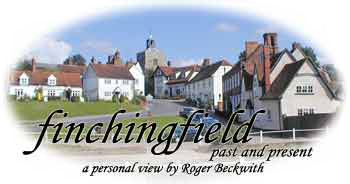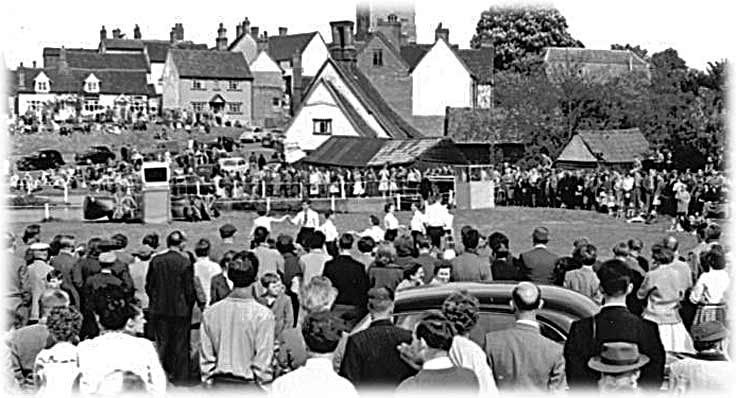
The Whit Fair has attracted a sizeable crowd and here they are watching dancing on the green.
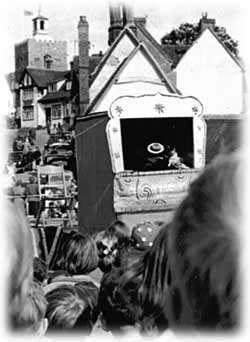
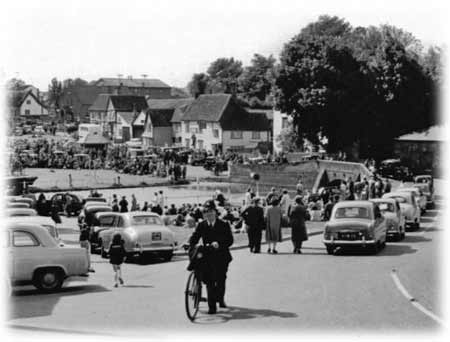
Punch and Judy entertain the children while the local law man seems happy to leave the event unpoliced.
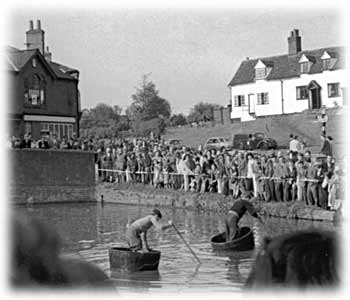
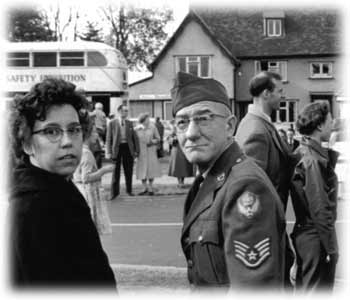
A tub race on the pond and an American visitor spots the camera.
James took part in events, as he recalls:
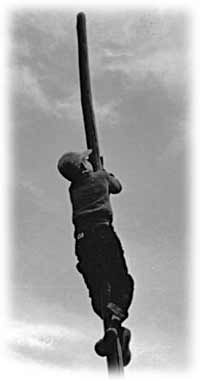
I won the greased pole climbing contest that was held on the green. There were grown men in lumber jack gear who couldn't get up that pole. My mom never could wash out the grease from my sweat shirt. I took the money that I won and bought my mother a little pair of earrings.
James remembers other days. His father, Arthur, had joined the USAF in 1941 and served in the South Pacific during W.W.II and later in Korea. He and his family arrived in England in 1956.
It was a wonderful experience to spend three years in England when my father was based at Wethersfield! Many service men lived on the site with their families. We had friends that lived there and would often visit them. It was called "Mushroom Village", but we decided we wanted to live off of the base. And you know, you learn so much more about the English culture by doing that.
I had some English friends wherever we lived. We spent our first year in Witham in a large house close to the downtown area. We had coal heating but the upstairs was cold. I became very sick that year and missed two weeks of school while I was in hospital. I was paralyzed for some reason. They never knew what I had. "Stomach flu" was all the English doctor could think of. I was friendly with an English boy in the room next to mine. We were isolated because they didn't know what we had, but I could talk to him though a window between the rooms. My mom took me to visit him after we got out. He couldn't walk.
I became friends with an English boy named Robin who lived close to me. We shared the house with another Air Force family that year. They had a boy and girl about the age of my sister and me, so we had a good time together.
We went to a lot of English films just around the corner from where we lived in Witham. I remember Tommy Steel being in a lot of them. "Bambi" came out while we were in England and "The Bridge over the River Kwai". I can still whistle the theme song from that movie. The first time we went to a film, the British National Anthem started playing and everyone but my family stood up. We didn't know what to do. So we started getting booed. We almost instantly figured out we'd better stand, too. So from then on we knew what to do.
We rode the trains a lot. They were smaller than ours but I liked that. Sometimes we'd leave Witham and my mom would take us to another town which had a long, high slide in a park. We don't have them like that over here. We often went touring. My mom saved every receipt from every hotel we stayed in. I've got them now. I'd like to go back someday and see if those hotels are still there.
I really loved the English candies and the Cadbury's chocolate. But really, really missed the US soft drinks. I learned to drink what you had at that time, but it was a lot different than I had been used to. I loved getting "Fish and Chips" in Witham and other towns. We did that a lot. It was always wrapped in newspapers. There was a nice toy store in Witham that we went in a lot. I still have most of my English toys from that time. I used to play with the Skittle game in the store but never had one. We have a lot of "Noddy" books. I've read them to my children. I loved "Guy Fawkes" night. "A Penny for the Guy?"
The next year we moved to Hatfield Peverel and lived way out in the country. It was another large house. But all we had for heat in that winter was a little oil heater that was shaped like a stove pipe. The house had a library. My mom used to find coins from India coming out from under the walls. I still have some of them. I used to wonder if there might be coins hidden in the walls. Sometimes you could hit a wall and a coin would slide out. We were told that a man that had been stationed in India with the British forces had lived there.
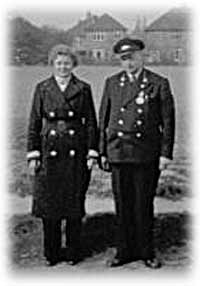
There was a large apple orchard at the back of the house and I used to eat some apples when they were ripe. I had a pet hedgehog for a short time while there. He eventually decided that he'd make a break for it. I can still remember the feel of that spiny back. There was a little concrete pond behind the house that had some kind of salamanders living in it. I used to catch them, look at them, and put them back in. My dad put up a badminton net and bought us some rackets with presses and I learned to play badminton. My father would play tennis with my mom vs other people and I would have to tag along and amuse myself when they played.
My sister and I made friends with the English family that lived next door. We had a great time there. We became friends with the family that had the gas station in Hatfield Peverel. The parents are gone now, but we still have contact with one of their daughters and her husband and their family. While we were living in Finchingfield, we went to visit them during the winter, got snowed in, and had to spend the night. It was cold in that house. They heated up the sheets with hot water bottles and in the beds we went. They made a Christmas pudding that had a hidden shilling in it. Whom ever found the shilling was supposed to have good luck. And I got the shilling without losing a tooth. (I did get pushed against the monkey bars at the base school while we were living in Finchingfield and had a tooth broken off by a girl. She brought the broken tooth to the office for me while I was in there). I got bitten by their big parrot when I stuck my finger in the cage. The English gardens are so lovely. And theirs was kept up nicely.
English foods I liked. Yorkshire Pudding was a hit with me. Your Brussel sprouts are bigger, it seems, than ours. We heard when we got to England, that "The English heat their tea to make it hot. The Americans put ice in it to make it cold. The English put in sugar to make the tea sweet and the Americans put in lemons to make it sour." I still have a nice tea set that my mother got while there. I learned to eat boiled eggs in the little cup-like holders. Pop the top of the egg with a spoon and dig in. No one over here has ever heard of that. But we did it a lot. The English marmalade was very tasty.
We heard that if you put down your fork in a restaurant that they would take away your plate, thinking you were through. So we tried not to lay down our forks, but we did forget, and by golly, the waiter took the plate away. The English ate with a fork and knife in a different way than I did. I don't know if all do that but at that time our friends would mash food onto the backs of their forks with their knives. I never did master that technique.
We went to a lot of motorcycle races while there. I can still remember the smell of the cockles and mussels that came out the food tents. We saw Gipsies everywhere. One English friend took us in his car to go eel fishing. He had strung up his hook with what looked like 100 earth worms before we left. We had to drive through a Gypsy camp to get to the stream where he was taking us. They stopped us. He might have had to give them some money to let us go through. I saw an eel swim by but we didn't catch anything.
We went to the seaside a lot. Clacton-on-sea is a place we went quite often. The large candy sticks were a favorite of mine when we were there. Probably got too much sugar at that time. My mom got her English driving license while we were there. My father had probably one of the first VW Microvans the first year we were there. But being American, it is hard for us to drive on what is "The wrong side of the road for us". So my mom would take a corner and find herself being honked at as we would be driving on the wrong side of the road. The only straight roads in England, we were told, were the ones built by the Romans. I can remember taking a trip and driving on one straight stretch. It was the first time in a long time that I had seen a straight road. I had become used to the curvy roads of England. You should come over here and see our roads.
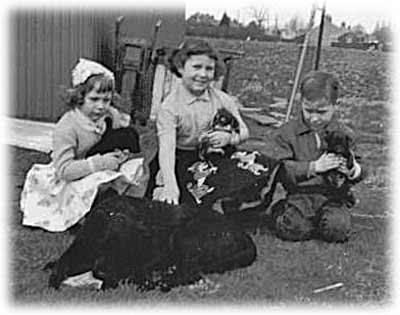
There was one other US family that lived in another part of Finchingfield that I contact now. I happened to run into their father when I was in college here in 1974. He was working there so we got to know each other again. He said he remembered me climbing that greased pole.
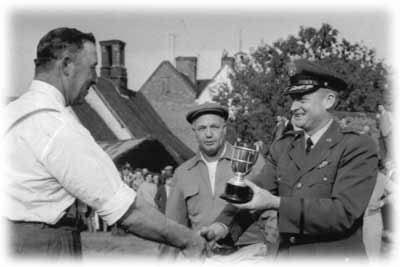
I had some other US school friends that lived in the village. Behind their house was the stream that runs through the village. I caught some little fish using a bent pin. A little up the hill from where we lived, was a large house that had a pond by it. I remember some kid had a tank with small fish in it by his house.
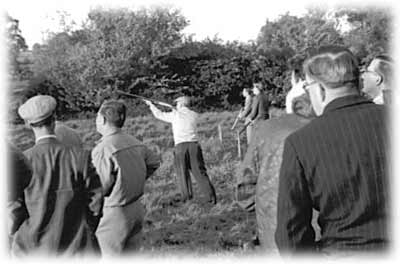
I still have my cricket bat from when I used to play in England. There was a little playground on the hill there that had swings and a sandbox. I was in the sandbox with another boy when we were threatened by a group of bigger boys and girls. We ran to a tall fence (over 8' at least) and scrambled over it. Then we stood on the other side looking at the kids that couldn't make it over the fence. But they figured out they'd have to go around it, so when the face off ended, away we ran to the pub and hid behind the counter. The owner ran them off when they came in - we were safe! I wish I could go in there now and have a brew.
Someday, maybe, I can come again for a visit.
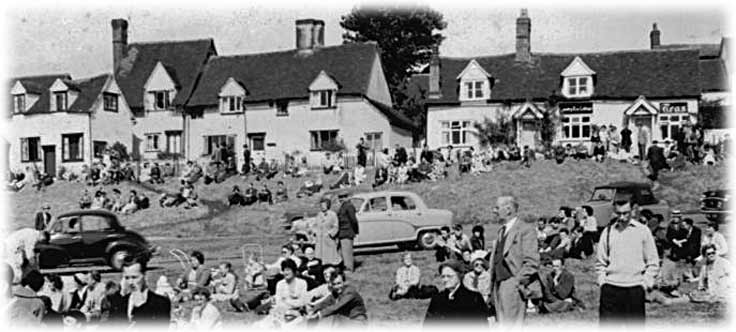
Article ©2003 James Richards. Photos ©1950s.
